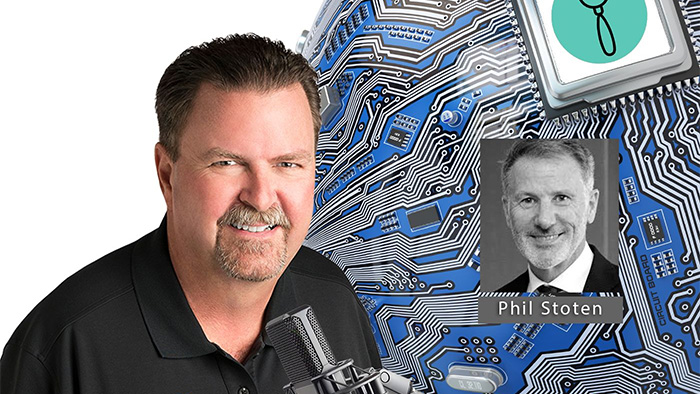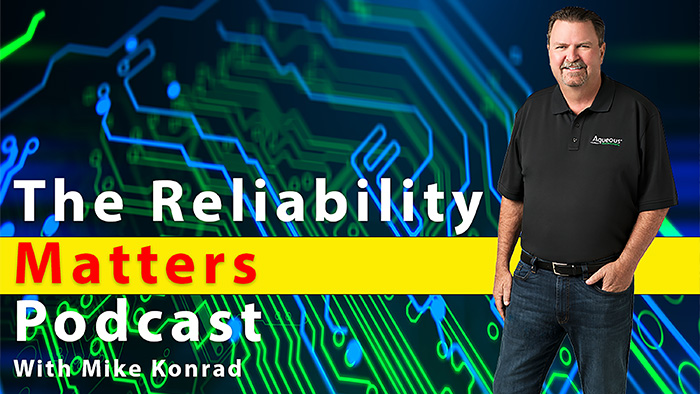Philip Stoten: The Interviewer becomes the Interviewee on the Reliability Matters Podcast
When we formed the business it was clear to us that to focus on Industry 4.0 and Innovation, and to avoid becoming a transactional based business, we had to spin a few plates that were outside of simply finding problems and creating solutions. What some call listening to the Voice of the Customer (VoC).
It’s an early business lesson that many companies ‘shop fronts’ are not always their main income. Sales is seen as short term thinking as it pays the bills today but may cost you tomorrow, where other activities which we knew we had to invest time into can be considered long term thinking. A lean startup business is perfectly aligned with long term thinking due to the lack of debt.
You can consider it like education, at the start you have little of it, so you put in the time to invest in yourself and along your journey you seek little from it, until you reach the end when that debt needs to be repaid. If you start with a high amount of debt you will want to pay it off quickly, turning down volunteering that may open doors to opportunities, and instead seek well defined paid work where you will overtime be placed in a rut.
One such activity was community engagement such as writing these blogs to express our views and ultimately communicate to similar minded people that they are not alone. We knew of the Silver Tsunami before it was coined and the next generation would be conducting the Smart Factory however we had to communicate to the existing generation what Industry 4.0 was - The Alignment to the Digital Economy - thus we have always seen it as a People Revolution of Today, where the Smart Factory is that of Tomorrow.
With good SEO (Search Engine Optimisation), we have been successful in written based form and with the development of the SMEMA Hermes Adaptor we have been contacted by many students from around the world wanting to create their own.

It’s been very warming to be a remote project manager and help these students break down their solutions into hardware and software deliverables and point out the gotchas along the way. I’m just jealous that my College didn’t have any focus on Electronic Assembly.
Podcasts
Another means to share our take on the industry was the consideration of starting a Podcast. Having been listening to them for over 20 years, back when the Co-Inventor of the RSS feed Adam Curry used to publish the Daily Source Code (DSC) Podcast which was originally a vehicle to bring together software developers of Podcast clients with the development of RSS and eventually provide a way of promoting other Podcasts.
With a business Co-Founder that worked within Hospital Radio it seemed a good use of his skills and I could easily become the opinion piece if guests weren't present.
The challenges we saw was whether to focus it on the smaller manufacturing sector of Electronic Assembly, or expand it to all of manufacturing. This would determine how it would get promoted. Also what would we call it to hit the correct SEO? Ultimately we put the idea on ice but instead I’m a keen listener to other Electronic and Industrial podcasts.
Reliability Matters Podcast
For the same challenges we identified, I was late to the party to discover the Reliability Matters Podcast hosted by Mike Konrad.
The Reliability Matters Podcast premiered in November 2018 and is targeted at electronics assembly industry. Each episode covers topics related to reliability, best practices and environmentally responsible assembly techniques. With insights from experts across the electronic assembly industry.
Mike covers a vast range of conversations from industry leaders in a casual format only achievable by audio and is perfect for those busy working in the industry as it can be consumed on the go.

Philip Stoten
One veteran of the electronics assembly journalist scene is Phil Stoten who runs publishing company Scoop. Phil publishes trade show interviews with equipment suppliers on YouTube so has always been my go-to to refresh my knowledge of where we are with Industry 4.0. The videos are often published under other umbrellas such as EMS Now and I have already previously written about a more relaxed video format with Eric Miscoll.
The Eric Miscoll Show has given Phil an avenue to open up about his view of the industry without too many eyeballs from the equipment suppliers who normally sponsor his trade show studio. That said I have always wanted to hear Phil’s raw feelings of the Industry and you can’t relax someone more than interviewing someone using the medium of audio. So I was delighted to listen to Episode 31 of the The Reliability Matters Podcast where Phil is interviewed by Mike Konrad at SMTAI in Chicago on the trade show floor.
What did I learn?
And what are my thoughts...
[4:33] Industry 4.0: We have been talking the talk but not walking the walk. Industry 4.0 has become a Buzzword.
I feel there is a great confusion between Industry 4.0 and Smart Factory. Industry 4.0 is a revolution, and revolutions have either happened, or are happening, they are not the future. We see Industry 4.0 as a People Revolution and so we must consider how the current people and skillset can assist the modernisation of current manufacturing.
The German Government and Industry quite rightly coined the Industry 4.0 buzzword as a flag and wakeup call to the manufacturing industry that the Digital Economy has catapulted itself ahead and manufacturing has been left behind. The next generation of engineers have also been left behind and the Silver Tsunami is yet another wakeup call that the manufacturing industry isn’t talking about the people.
With the theme of Data and Control, the execution of recruiting new people into manufacturing isn’t going to be direct. The industry isn’t glamorous enough for the next generation of graduates nor does it command the wealth you can find in other industries, so the execution instead is working alongside the Digital Economy and talking the same technological languages to remove any barriers.
[4:47] Data Standards don’t really matter and Electronic Manufacturing Services companies just want their equipment connected.
[6:05] Mike was surprised what data customers wanted and what remote control they wanted to achieve.
The industry has been very customer driven. Voice of Customer (VoC) is often a term the sales teams use which can create a great order book, but innovation is reliant on the customer. Many businesses will grow fast focusing on the Voice of the Customer but will Plateau as innovation dries up.
Take the American fast food chain Subway, which allows its customers to choose the filling of the submarine sandwiches it sells, versus a Supermarket which sells pre-made sandwiches from its shelves. The supermarket must be confident that it’s offering is what the customer is willing to purchase, resulting in a lot of constant moving market research as trends change.
This analogy can be taken multiple ways, in the world of data, be a Subway and give all the ingredients (the data) to your customer. But don’t assemble the sandwich (the solution) for each customer. It will sell equipment and solutions but it’s short term thinking. Create software ecosystems and allow others, or even your customers to do that themselves.
In the world of hardware or equipment this analogy should be taken more like the Supermarket. Being confident to say No to customer requests, instead understand the customer's problem, or ideally know the customer's problems before they know themselves and therefore having no contact with the customer at all, therefore avoiding VoC.

As you can see with the analogy, the mindset of Hardware versus Software makes it difficult for one business to run both mindsets. Quite often hardware businesses struggle to sell software if they have a legacy hardware sales team that is too used to VoC thus innovation is poor.
Mike’s surprise reminded me of two simple questions I asked equipment suppliers at Productronica with mixed results.
What data can you supply me? and How can I get hold of it? I have also heard of the concerns of remote control safety but if you consider dark factories and manufacturing as a service it makes complete sense.
[7:20] Industry 4.0 has been lived too long in the Marketing department and it needs to live on the factory floor
[7:45] Phil’s 4 Rs
I have to totally agree with Phil on this one. Previous generations of solutions have lived in the boardrooms where Industry 4.0 is giving ownership to production staff on the factory floor. Each company will have their own solutions but these will be based on software platforms to make them interchangeable. A true IIoT (Industrial Internet of Things) solution does not provide an end-to-end solution, instead it provides building blocks to create a highly customised solution for batch size 1. No EMS wants to be the same as another EMS and often these EMS companies are being controlled by their customer, aka VoC.
Phil's 4 Industry 4.0 Rs are:
- Read
- Record
- Relay
- React

[9:22] Artificial Intelligence
Phil mentions Artificial Intelligence (AI) and to prevent us having the same confusion we are having with Industry 4.0 versus Smart Factory, let's make it clear what AI is. Simply put, AI is Black Box logic. Meaning logic that you may not have the source code for. Photoshop is a good example. You apply the photo into Photoshop, you apply some settings and it spits out a new photo. There may be some ‘Intelligence’ because it may not apply your settings verbatim each time as other variables may be considered, but as it’s a black box, you will never know unless the software gives you that option. Therefore any software you purchase externally can be considered AI and why marketers love to use the term because it creates a level of abstraction that can't be challenged.
[10:06] The Silver Tsunami
[11:13] Retirement - White, Male and Middle Class
[11:56] Tribal knowledge is a danger
[13:04] Make the industry more attractive
[13:47] Benefits of the Silver Tsunami
[13:55] New and Moving talent
Having colleagues and mentors twenty years my senior I identified the Silver Tsunami well before I first heard the term. Even when I was at the coalface, when colleagues retired there seemed to be no provision for their replacement and the knowledge hole they left would be identified many months or even years later.
I think we can read between the lines of the Silver Tsunami and conclude it is already taking effect within the world of microchip development and there is a constant wave of companies being acquired which is resulting in market consolidation. This is a big sign that the industry is shrinking.
His statement of Tribal Knowledge reminds me of being told that customers don’t want their equipment on networks due to viruses and security fears. My response was we must be ready for change.
Like Phil, I can only put a positive spin on the Silver Tsunami. It will create new businesses, maybe at times reinventing what has come before, but also with new thinking. As I like to say, there was IBM before Microsoft and Apple.
As we align to the Digital Economy the location of this new skill will be irrelevant and online communities will be born. Manufacturing as a Service will give the bedroom startup the tools to manufacture without visiting a factory and batch size 1 will be achieved. The general theme of consolidation will continue to occur and middlemen, who could be seen as the equivalence of the secretaries of the computerisation generation, will be removed, meaning that component distributors will become contract manufacturers themselves. We are already seeing this change in China.
[18:25] The hardware has become the commodity
[18:48] Software and Solutions will be the differentiator
[19:40] Value over Price
Pre-iPhone the mobile phone became a commodity product. Nokia would change the case of their products to make it look new, but the underlying guts of the phones were all the same. Phil quite rightly identifies that SMT production line equipment now all act and work the same. Like the PC generation, some SMT manufacturers play on their speed and accuracy, but Apple never played that game. It released the iPhone with one killer hardware feature; a large multitouch screen. Even this feature wasn’t to make the phone a phone, it was to assist the creation of killer software. We are also seeing this trend with Electric Vehicles. Often EVs are now packed with gadgets and gizmos unrelated to getting from A to B. So to create killer companion software is key to future success.
My feeling is if any small players in the market want to catapult themselves they should partner, not acquire, with a player within the Digital Economy. Keeping the ownership high and tribal knowledge low.
The Undercover Voice of the Electronic Assembly Industry
Phil concludes by talking about Scoop and how he writes on behalf of his clients which understandably makes him often under the thumb of the Industry. What the Electronic Assembly Industry really needs is the creation of impartial equipment reviews and if that can't be possible then a community that can share their feedback to give the industry the push it needs.
It often amazes me how many customers I meet who know little about what is available on the market and tend to buy only from suppliers they know of by brand name alone.
There are now many electronics YouTubers reviewing lab equipment and I wonder as these people mature we may see their style of commentary and review pop up in the world of Electronic Assembly. Dave Jones from the EEV Blog is a favourite watch. I can also recommend the Amp Hour Podcast featuring Dave and Chris Gammell from Contextual Electronics.
About 4IR.UK
4IR.UK is a Industry 4.0 solutions provider for the smart industrial manufacturing sector. It develops bespoke Extensions for the MultiPlug Edge Computing Platform that allows for real time configuration of production line equipment. The flexibility of off-the-shelf software combined with inside industrial experience means that 4IR.UK is ideally placed to anticipate and respond to a factory's changing needs.


